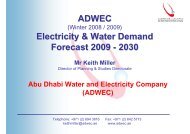ADWEC 2008 Statement of Future Capacity Requirements 2008 ...
ADWEC 2008 Statement of Future Capacity Requirements 2008 ...
ADWEC 2008 Statement of Future Capacity Requirements 2008 ...
You also want an ePaper? Increase the reach of your titles
YUMPU automatically turns print PDFs into web optimized ePapers that Google loves.
RSB Approved Version- 4 th August <strong>2008</strong><br />
4.4 Demand Scope<br />
Prior to the <strong>2008</strong> <strong>Statement</strong>, the GSS / DSS calculations did not consider the impact <strong>of</strong><br />
electricity and water exports to the other Emirates on the required capacity<br />
calculations as exports were either temporary and utilised spare capacity, or in the<br />
case <strong>of</strong> electricity exports to FEWA they were isolated from the Abu Dhabi electricity<br />
transmission system.<br />
With the ENG fully completed in April <strong>2008</strong> and <strong>ADWEC</strong> having firm electricity and<br />
water export supply contracts with:<br />
• Fujairah Energy Company (FEC)<br />
• Federal Electricity and Water Authority (FEWA)<br />
along with a water only firm export contract with<br />
• Sharjah Electricity and Water Authority (SEWA)<br />
it became necessary to include these demands in the GSS / DSS calculations for the<br />
first time. Full details <strong>of</strong> the demand forecasts and exports can be found in Annex A.<br />
In 2010 alone <strong>ADWEC</strong> has total firm electricity export contracts <strong>of</strong> 1,250 MW (FEC<br />
250 MW and FEWA 1000 MW) rising to 2,950 MW (FEC 450 MW and FEWA<br />
2,500 MW) in 2015.<br />
The above firm contracted export electricity quantities have been added to Abu<br />
Dhabi’s peak demand (after including transmission losses, associated auxiliary<br />
consumption and an assumed diversity factor) in order to calculate the required<br />
capacity using a GSS <strong>of</strong> LOLE 0.1. Thus the Northern Emirates exports are assumed<br />
to have the same GSS as applied to the Emirate <strong>of</strong> Abu Dhabi.<br />
Note that an interesting feature <strong>of</strong> the LOLE calculation is that the required capacity<br />
does not increase at the same rate as peak demand. So the higher the level <strong>of</strong> peak<br />
demand the smaller the percentage <strong>of</strong> reserve capacity. Thus adding the Northern<br />
Emirates’ supply exports to the GSS calculation significantly reduces the percentage<br />
<strong>of</strong> reserve capacity. By 2030 the percentage <strong>of</strong> reserve capacity will be just 11% <strong>of</strong><br />
annual peak demand, or less than half <strong>of</strong> the percentage <strong>of</strong> reserve capacity in <strong>2008</strong>.<br />
It is clear from press reports 11 that the Northern Emirates currently have a significant<br />
shortage <strong>of</strong> electricity and water production capacity, and that this shortage could<br />
possibly last for several years until new capacity is added by the relevant utilities.<br />
This shortage <strong>of</strong> Northern Emirates’ capacity and the start <strong>of</strong> the GCC Grid in 2010<br />
will provide <strong>ADWEC</strong> with good alternative markets for any surplus electricity<br />
generation capacity that may arise because <strong>of</strong> delays to the Emirate <strong>of</strong> Abu Dhabi’s<br />
mega projects. The consequences <strong>of</strong> surplus electricity generation capacity are now<br />
much less severe than in the past when alternative export markets did not exist.<br />
11 See for example The National newspaper, Wednesday June 11, <strong>2008</strong>, www.thenational.ae,<br />
Energy Crisis Slows Northern Growth.<br />
<strong>Statement</strong> <strong>of</strong> <strong>Future</strong> <strong>Capacity</strong> <strong>Requirements</strong> <strong>2008</strong> – 2030 28



